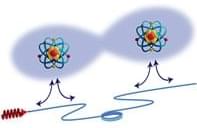Popular Summary.
Remote entanglement is crucial for quantum computing, sensing, and communication. Traditional methods for entanglement generation often depend on direct interactions between quantum bits (qubits) or the exchange of entangled photons. In this study, we demonstrate an alternative approach, where we create and preserve entanglement between two noninteracting qubits through dissipation into a shared waveguide.
While dissipation is typically viewed as detrimental, tailored dissipation can be harnessed to drive a system into complex quantum states while actively protecting it from decoherence. This approach, known as autonomous stabilization, has been previously used to create entanglement. However, entanglement stabilization has been confined to short distances due to the challenge of engineering shared dissipation between remote sites. Our experiment overcomes this challenge by employing an open waveguide as a one-dimensional photonic bath. We demonstrate that, under appropriate conditions, the interference of photons emitted into a waveguide from two qubits can stabilize them in an entangled stationary state when the qubits are strongly driven. Crucially, we can reconstruct the entangled state despite significant waveguide-induced dissipation by measuring the emitted photons. Our demonstration is made possible by precise control over qubit frequencies and efficient qubit-waveguide interfaces in superconducting circuits.
